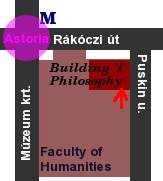Intentionality – a
Physicalist Account
lecture
course
Wed 16:00-17:30, Room 224 (Múzeum krt. 4/i)
Codes:
BMA-LOTD17-206.02
BMI-LOTD17-206E.02
BBN-FIL-401.59
BMA-FILD-401.59
BA-ERA-IPH-L-25
MA-ERA-IPH-L-29
Program
LyX Document
LyX Document
Intentionality is aboutness;
the feature of thoughts and words, whereby
they refer to, or are about things. The main
topic of this course is naturalizing
intentionality; that is to say, whether we can
give an account of intentionality that can be
reconciled with a physicalist (or naturalist)
world view; whether we can give an account of
how it can be that, as John Haugeland puts it,
“any part or feature of the universe
represents or is a reason for another”.
The usual discourse on the
problem of intentionality takes place in a
quite absurd philosophical context; a context
which is a cross-section of a bundle of
totally incompatible doctrines. To give just
one example: for physicalism it is a perfectly
natural idea to explain the relationship
between intentional states and intentional
objects in terms of causal processes in the
world. In the usual discourse, one of the
serious objections to the causal theory is
that it is inadequate for capturing
representations of abstract objects, such as
logical and mathematical objects. Meanwhile,
physicalism denies the mere existence of
abstract objects. It seems that the whole
discourse is directed towards providing an
interpretation of intentionality that is
equally consistent with Platonism, mentalism,
physicalism, fictionalism, modal realism and
modal anti-realism, empiricism, rationalism,
operationalism, and holism; with all views on
the nature of logic, mathematics, language,
and the mind; with all positions on the
fundamental questions of epistemology and
philosophy of science. The result is perhaps
not surprising. As Cathal O'Madagain writes in
the last sentence of his article
'Intentionality' in The Internet
Encyclopedia of Philosophy: “as things
stand, there is no widely accepted solution to
the problem presented by intensionality for
naturalizing intentionality.”
The aim of the course is to
sketch a description of the phenomenon of
intentionality that remains exclusively within
the framework of a physicalist ontology. As we
shall see, this is made possible precisely by
a strict adherence to the ontological
framework imposed by physicalism.
Readings
-
J. Haugeland: Having
Thought -- Essays in the
metaphysics of mind, ("The
Intentionality All-Stars"), Harvard
University Press, Cambridge MA,1998.
-
C. O’Madagain:
Intentionality, The Internet
Encyclopedia of Philosophy,
https://iep.utm.edu/intentio/ (2022-08-18)
- T. Crane: Intentionality, Routledge
Encyclopedia of Philosophy, Version
1.0, London and New York: Routledge (1998).
-
L. E. Szabó: Meaning,
Truth, and Physics, In G. Hofer-Szabó, L.
Wroński (eds.), Making it
Formally Explicit, European Studies
in Philosophy of Science 6. (Springer
International Publishing, 2017) DOI
10.1007/978-3-319-55486-0_9. (Preprint:
//philsci-archive.pitt.edu/14769/)
-
L. E. Szabó: Physicalism
without the idols of mathematics.
[Preprint], (2021),
//philsci-archive.pitt.edu/20980/
Further readings
- W. Lyons: Approaches to
Intentionality, Oxford University
Press, 2002.
- J. Searle: Intentionality,
Cambridge University Press 1983.
- T. Crane, The Objects of Thought, Oxford
University Press, 2013.
- L.E.Szabó: Intrinsic, extrinsic, and the
constitutive a priori, Foundations of
Physics 50, 555–567
(2020). DOI:
10.1007/s10701-019-00281-z (Open
Access: https://rdcu.be/bKxdO)
Grading
criteria, specific requirements:,
Oral exam
from the material of the lectures. Video
records and the slides of the
lectures will be available.
|
|

|

Múzeum krt. 4/i
|
|
|

 LÁSZLÓ E. SZABÓ
LÁSZLÓ E. SZABÓ














